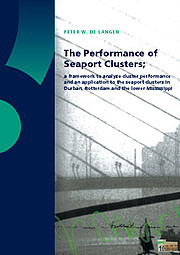The Performance of Seaport Clusters; A Framework to Analyze Cluster Performance and an Application to the Seaport Clusters of Durban, Rotterdam and the Lower Mississippi Defended on Thursday, 22 January 2004
This PhD thesis deals with the performance of clusters. Even though cluster studies are numerous, a coherent framework to analyze cluster performance is lacking. In this thesis, such a framework is developed, drawing from different schools that deal with clusters. Central in the framework is a distinction to variables of cluster performance related to the structure of a cluster and variables related to the governance of a cluster. Four structure variables - agglomeration ands disagglomeration forces, internal competition, heterogeneity of the cluster and the level of entry and exit barriers - and four governance related variables - the presence of trust, the presence of intermediaries, the presence of leader firms and the quality of collective action regimes - are identified and discussed. The validity of these variables is confirmed in the three case studies, of the port clusters of Rotterdam, Durban, and the lower Mississippi. The strengths and weaknesses of the three port clusters, the importance of the variables discussed above and opportunities for policy and management to improve the performance of clusters are discussed.The results of this study are relevant for cluster scholars and for scholars specializing in port studies. The thesis is also relevant for (port) cluster managers and for managers of firms in (port) clusters, since implications of this study for policy and management in (port) clusters are discussed.
Keywords
Clusters, Performance, Governance, Seaports, case-studies, survey, Rotterdam, Port Management, Collective Action Regimes







